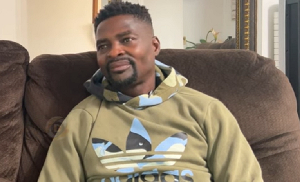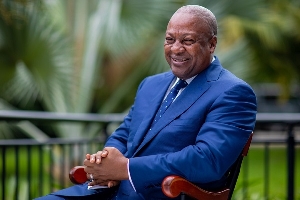- Home - News
- TWI News | TV
- Polls
- Year In Review
- News Archive
- Crime & Punishment
- Politics
- Regional
- Editorial
- Health
- Ghanaians Abroad
- Tabloid
- Africa
- Religion
- Election 2020
- Coronavirus
- News Videos | TV
- Photo Archives
- News Headlines
- Press Release
General News of Tuesday, 15 January 2002
Source: The Independent Online
Public calls for trial of Dutch Defecator
Almost two weeks after the withdrawal of charges against Kamaiel van Roussum, a Dutch Construction Supervisor for defecating into a drinking bucket used by his workers and subsequently filling it with water for the same workers to drink, sections of the public have called for the trial of the case.
This is against the backdrop of the withdrawal of the charge of causing public nuisance by the 70 workers which was acceded to by the Madina Community Tribunal chaired by Mrs. Ivy Heward-Mills
According to Section 287 (c) of the Criminal Code, 1960 “whoever without lawful authority or excuse (the proof whereof shall lie on him) … corrupts or fouls the water of any public well, tank, spring, reservoir, or place used or intended for supplying water to man or for fish culture, shall be liable to fine not exceeding 500,000 cedis and shall, upon conviction for a continuance or repetition of any such offence, be guilty of a misdemeanour.”
Some legal practitioners consulted said in cases of misdemeanour, a court has the power to encourage out- of-court settlement.
Yet again, other legal practitioners raised the issue of van Roussum’s ‘intent’ in committing the crime. According to the Daily Graphic report of Wednesday, December 12, 2001 on the case “police investigations…..revealed that he[Kamaiel van Roussum] had committed the contemptible act for at least 15 times.”
But his ‘bucket’ became full on December 6 last year when “one of the workers who was returning from break saw the accused defecating into one of the…buckets.
The astonished worker paused for a while, during which he saw the accused rinse the bucket with water before filling it again for the workers to use.
The worker then informed his colleagues about the incident, after which a report was made to the police, leading to the arrest of the expatriate” Section 11 of the Criminal Code, 1960 which deals with “intent” and hence explains the above law, further worsens van Roussum’s case as its states in sub-section (1) that “If a person does an act for the purpose of thereby causing or contributing to cause an event he intends to cause that event, within the meaning of this Code, although either in fact or in his belief or both in fact and also in his belief the act is unlikely to cause or to contribute to cause the event.”
Sub-section (2) also stipulates that, “If a person does an act voluntarily, believing that it will probably cause or contribute to cause an event, he intends to cause that event, within the meaning of this Code, although he does not do the act for the purpose of causing or contributing to cause the event.”
In a snap survey conducted by The Independent 51 out of 52 respondents were disgusted with withdrawal of the case. Only one respondent saw nothing wrong with it.
According to a section of the public who spoke to The Independent, in the case of Kamaiel van Roussum, his “act” was intended to cause public nuisance since “ he defecated into the [drinking] bucket of the workers then filled it with water after emptying it.”
“It was intentional,” says one person, who maintains that the “event” van Roussum intended to cause is the workers drinking the water, hence his later decision to fill the same bucket with water after easing himself into it and emptying it.
He could have thrown the bucket away or even destroyed it after easing himself into it instead of filling it with water.”
Some others maintained that van Roussum’s later explanation that “he was suffering from diarrhoea and that it was his intention to dispose of the bucket permanently,” does not wash in the face of the provisions of the Criminal Code Act,1960 on intent.
In a related development, the Judicial Secretary, Mr. George Afflah Aryeetey told this Reporter that the case can be brought back to trial since it was not tried by the court but simply withdrawn by the plaintiffs.
He said if van Roussum was tried, acquitted and discharged, he could not be brought back to trial; in that case he can claim “autrefois acquit” (tried and acquitted) and, also that a person can not be tried twice for the same offence.
34 of the respondents called for the 70 workers who brought the case and later withdrew it for an out-of-court settlement to be put on trial.
Again, Mr. Aryeetey says, those workers “could be charged for deceiving a public officer,” since they (the workers) came to court to accuse Kamaiel van Roussum of defecating into their drinking bucket and then filling it with water for them to drink but later turned round to say they did not drink from it and so they are withdrawing the case.
A lady respondent however remarked that since it is the workers who brought the case to court they have the right to withdraw it.
According to a Daily Graphic report on the withdrawal of the case against van Roussum, The Tribunal allowed it under Section 73 of the Courts Act which “empowers the courts and tribunals to promote reconciliation when complainants agree to a settlement” but some of the respondents questioned its relevance to a case as serious as defecating into the drinking bucket of human beings and then filling it with water for them to drink.
One respondent said Ghanaians saw a ray of hope with the deportation of a management staff of Ghana Telecom who spat into the face of his driver and asked, “between spitting into someone’s face and defecating into a drinking bucket and filling it with water for other human beings to drink, which one is more serious?”
She said the Tribunal overlooked the seriousness of the matter, and quipped, “what would have happened if a Ghanaian had committed the same offence in Holland?”
There are special circumstances for which one can evoke Section 73 of the Courts Act, says Mr. Aryeetey.
For example, he said, when two brothers fight without either sustaining any bodily injury and the matter is brought to court, there is the likelihood that a verdict, since it will affect either party, and possibly start a vendetta in the family, the court, in a move to help ensure peace in the family, can call forth and empower the Head of Family (Abusuapanyin) to take the matter home for an amicable solution and report back to the court.
Another respondent said, “If reconciliation, the sort allowed by the Madina Community Tribunal, is the only form of settlement our courts are set up for, then let’s forget all the cases brought to the Fast Track courts against all the former public officials of the NDC since they are our blood brothers.”
Other respondents said some foreigners think they can take us for a ride in our own country and considered it a shame that such acts- like the withdrawal of this particular case against the van Roussum - sends the wrong signals to irresponsible foreigners who will always take it as a licence to perpetrate such disrespectful acts against our people.
Some of the respondents added that it is an anti-climax that the tribunal, after allowing the withdrawal of the case issued a warning that “foreigners who trample on the rights of Ghanaians will suffer the consequences.”
If the court is serious about driving that message home to irresponsible foreigners it should have prosecuted Kamaiel van Roussum. Wouldn’t that have been more effective in driving the point home, wondered one lady.










